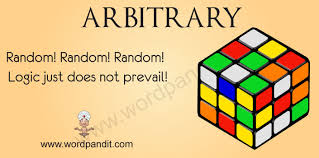arbitrary
英 [ˈɑː.bɪ.trər.i]
美 [ˈɑːr.bə.trer.i]
- adj. [数] 任意的;武断的;专制的
使用频率:

记忆方法
将“arbitrary”拆分为“ar-rib-u-ta-ry”,然后想象一个“a”人(用箭头指向)在“rib”(肋骨形状)上一边跳舞一边“纂”(用“u-ta-ry”暗示纂写决定),箭头指向的动作是不规则的,肋骨形状代表有节奏,整体动作表现了“arbitrary”(任意的、随机的)这一概念。
以上内容由AI生成, 仅供参考和借鉴
中文词源
arbitrary 随意的,任性的,专断的
arbiter,仲裁,裁判,-ary,形容词后缀。词义贬义化。
英语词源
- arbitrary
-
arbitrary: [15] Arbitrary comes ultimately from Latin arbiter ‘judge’, via the derived adjective arbitrārius. It originally meant ‘decided by one’s own discretion or judgment’, and has since broadened, and ‘worsened’, in meaning to ‘capricious’. The Latin noun has of course contributed a large number of other words to English, including arbiter [15] itself, arbitrate [16] (via the Latin verb arbitrārī), and arbitrament [14]. Arbitrage in the sense ‘buying and selling shares to make a profit’ is a 19thcentury borrowing from French, where it means literally ‘arbitration’.
=> arbitrate - arbitrary (adj.)
- early 15c., "deciding by one's own discretion," from Old French arbitraire (14c.) or directly from Latin arbitrarius "depending on the will, uncertain," from arbiter (see arbiter). The original meaning gradually descended to "capricious" and "despotic" (1640s). Related: Arbitrarily; arbitrariness.
权威例句
- 1. The choice of players for the team seemed completely arbitrary.
- 看来这个队的队员完全是随意选定的。
- 2. A good judge does not make arbitrary decisions.
- 一个优秀的法官不会作武断的判决.
- 3. You can make an arbitrary choice.
- 你可以随便做选择.
- 4. He makes unpredictable, arbitrary decisions.
- 他做的决定难以预料, 主观武断.
- 5. Arbitrary arrests and detention without trial were common.
- 随意逮捕和拘留屡见不鲜。